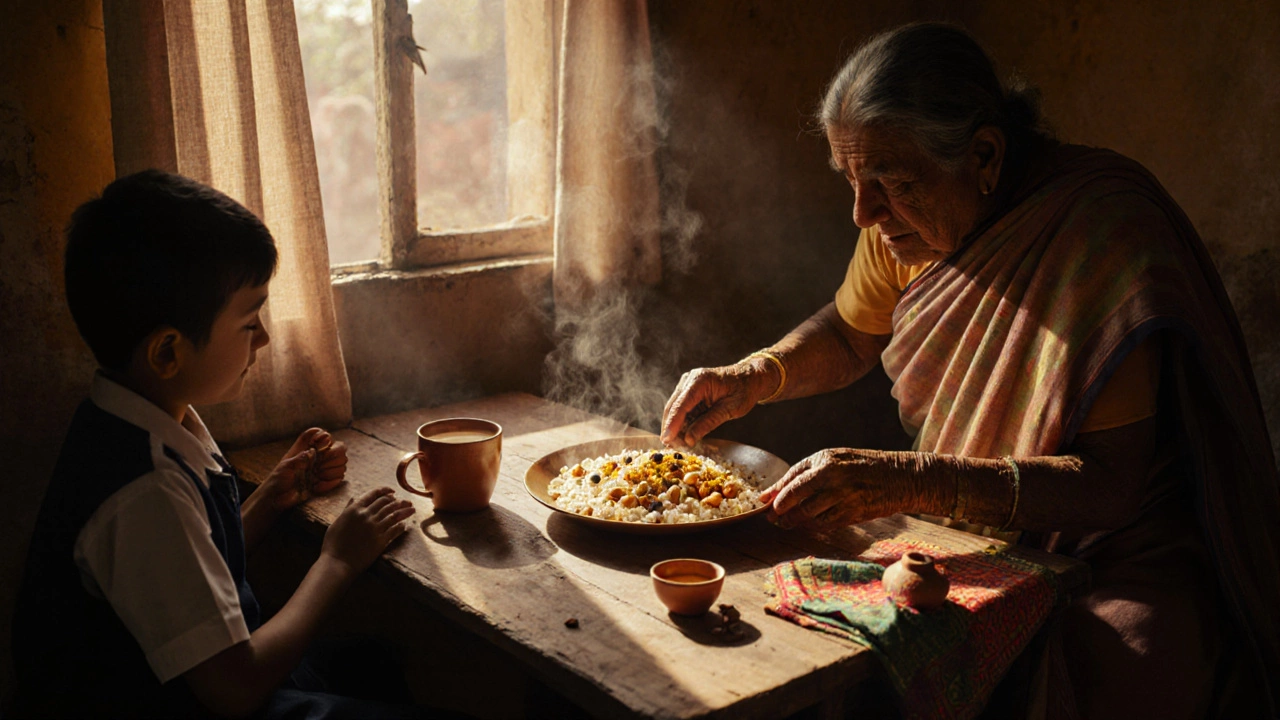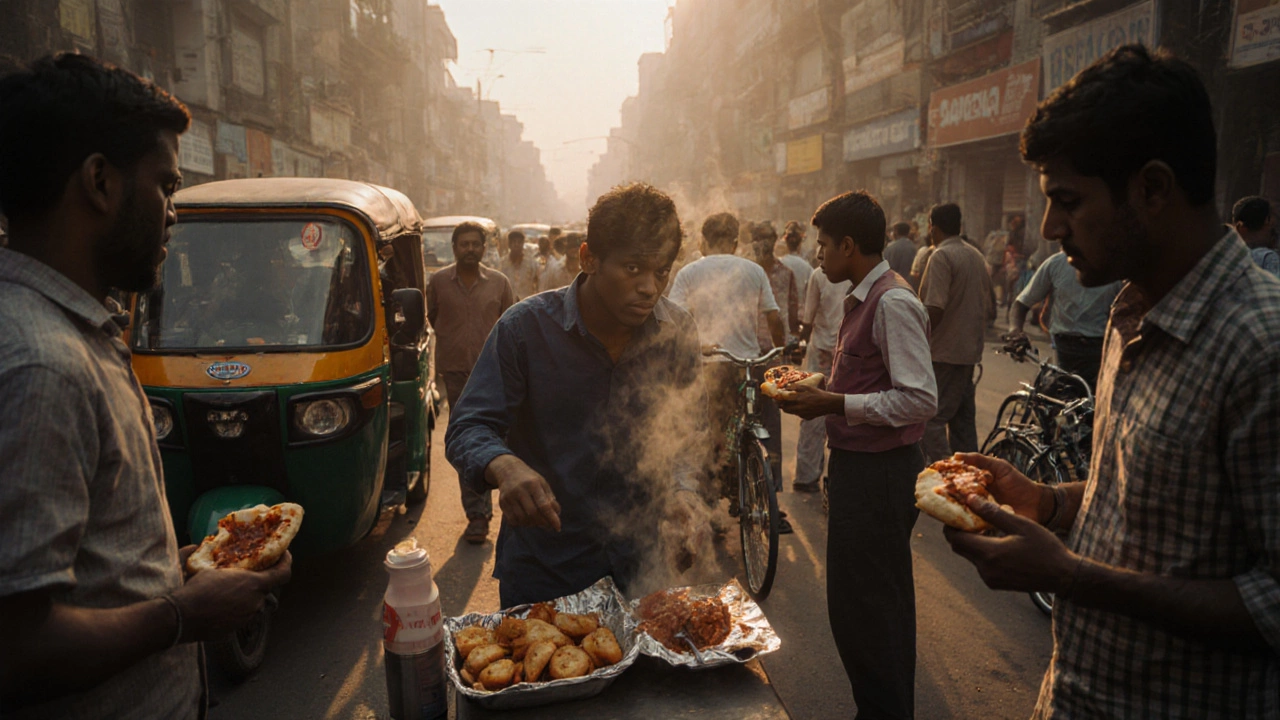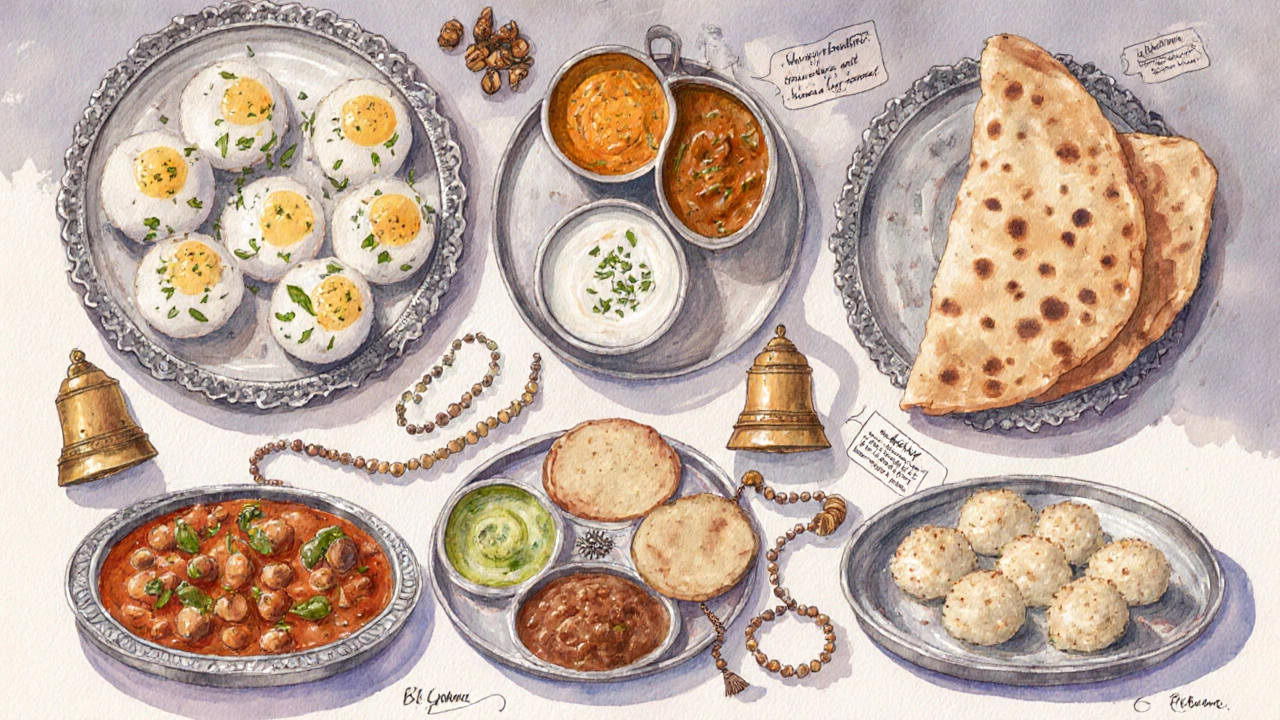Why Breakfast Matters in Indian Households

Indian Breakfast Energy Calculator
Calculate the approximate calories in your favorite Indian breakfast to understand how much energy your meal provides.
Most people in India don’t skip breakfast-not because they read a health article, but because their grandmother made sure they ate before school, work, or the temple. In India, breakfast isn’t just a meal. It’s a rhythm. A ritual. A daily reset that ties together culture, energy, and survival.
It’s not about calories-it’s about continuity
Ask someone in Mumbai why they eat vada pav at 7 a.m., or someone in Lucknow why they start the day with kachori, and they won’t talk about protein or fiber. They’ll say, “It’s what we’ve always done.” That’s the real reason breakfast matters in India: it’s the anchor of the day. When you skip it, you’re not just missing food-you’re breaking a chain that connects generations.
A 2023 survey by the Indian Council of Medical Research found that 87% of urban Indian children who ate breakfast daily performed better in school than those who didn’t. The difference wasn’t just in test scores-it was in focus, mood, and attendance. In rural areas, where kids walk miles to school, breakfast isn’t optional. It’s fuel. A plate of upma or poha keeps them going until lunch, which might come at noon or later.
Traditional meals are designed for energy, not trends
Western diets talk about high-protein, low-carb breakfasts. India’s breakfasts? They’re high-carb, high-fiber, and balanced with spices that aid digestion. Think about it: dosa is fermented rice and lentils-natural probiotics. Poha is flattened rice cooked with turmeric, mustard seeds, and peanuts. That’s not just flavor. Turmeric reduces inflammation. Mustard seeds boost metabolism. Peanuts give slow-releasing energy.
In South India, idli and sambar aren’t just breakfast-they’re a complete meal. Idli is steamed, easy on the stomach, and packed with plant-based protein. Sambar, made with lentils and tamarind, adds vitamins and minerals. In the North, parathas stuffed with potatoes or paneer come with yogurt or pickle. Yogurt cools the body after spicy food. Pickle? It triggers digestion before the day even starts.
These meals weren’t created by nutritionists. They were created by people who needed to work in fields, factories, or markets for 10+ hours. Their breakfasts were engineered for endurance, not Instagram posts.
Quick breakfasts aren’t shortcuts-they’re solutions
When people say “quick breakfast India,” they’re not talking about toast and jam. They’re talking about what’s already in the kitchen. Leftover rice? Make pongal. Leftover potatoes? Make aloo paratha. A handful of oats? Cook with jaggery and cardamom. These aren’t hacks. They’re heritage adaptations.
In cities like Delhi or Bengaluru, where people leave for work before sunrise, the most popular breakfasts are ready in under 10 minutes: poha, upma, dalia, or even a simple bowl of curd with rice. No oven. No fancy gadgets. Just a stove, a pan, and ingredients that last for weeks.
Even packaged options like instant upma mixes or ready-to-eat idli batter are rooted in tradition. They’re not replacing home cooking-they’re making it possible for people who don’t have time to grind dal every morning.

Skipping breakfast hits harder in India’s climate and economy
Temperatures in India often hit 40°C by 10 a.m. When your body is already working hard to cool itself, skipping breakfast means your blood sugar drops faster. You get dizzy. Irritable. Unable to concentrate. In offices without AC, in auto-rickshaws without AC, in schools without fans-that’s not a minor inconvenience. It’s a health risk.
And then there’s the cost. A plate of poha costs ₹20. A sandwich from a chain store? ₹120. For a daily wage worker earning ₹300 a day, breakfast isn’t a luxury. It’s a budget line item. Traditional meals use cheap, local ingredients: rice, lentils, vegetables, spices. They’re affordable. They’re filling. And they’re designed to keep you going until the next meal.
When urban professionals skip breakfast to “save time,” they’re not saving anything. They’re trading short-term convenience for long-term fatigue, sugar crashes, and afternoon cravings that lead to expensive snacks and coffee runs.
Breakfast is a cultural compass
In India, what you eat for breakfast tells you where you’re from. In Kerala, it’s puttu and kadala curry. In Odisha, it’s chhena poda with tea. In Punjab, it’s makki di roti with sarson ka saag. In Gujarat, it’s dhokla. Each region’s breakfast reflects its soil, climate, and crops.
Religion plays a role too. Many Hindu families avoid onion and garlic in the morning. Jain households eat only vegetarian, non-root vegetables. Muslim families might start with sheera or khichdi. These aren’t dietary restrictions-they’re identity markers.
Even the way breakfast is eaten matters. In many homes, the first bite is offered to the gods. In others, elders eat first. In some families, breakfast is eaten in silence. In others, it’s the noisiest meal of the day. It’s not just about food. It’s about belonging.

What happens when you skip it?
Studies from AIIMS Delhi and the National Institute of Nutrition show that skipping breakfast in India is linked to higher rates of obesity, poor concentration in students, and increased risk of type 2 diabetes-even in young adults. Why? Because when you skip breakfast, your body goes into survival mode. You overeat later. You crave sugar. You lose control over portion sizes.
And in a country where over 70 million people are pre-diabetic, that’s not a small thing.
There’s also the mental toll. People who eat breakfast regularly report lower stress levels. They feel more in control. That’s not magic. It’s biology. Eating in the morning tells your body: “It’s safe to start the day.” Skipping it says: “We’re still in danger.”
It’s not about being perfect-it’s about being consistent
You don’t need to eat five different dishes every morning. You don’t need to make homemade idli from scratch. You just need to eat something real. Something warm. Something that isn’t just sugar and caffeine.
Here’s what works for millions of Indians every day:
- Leftover rice with yogurt and a sprinkle of salt
- One paratha with a cup of tea
- Handful of roasted chana and a banana
- Oats cooked with milk, jaggery, and nuts
- Boiled egg with roti and pickle
These aren’t “healthy breakfast ideas.” They’re just what people eat. And they work.
Breakfast in India isn’t a trend. It’s a tradition that keeps people alive.
It’s not about calories. It’s about connection. It’s about surviving the heat, the long hours, the stress, and the cost of living. It’s about honoring your parents’ habits, your grandmother’s recipes, and your own body’s needs.
So if you’re wondering why breakfast matters in India-the answer is simple: because without it, the day doesn’t start right. And in a country where the day starts before dawn, that’s everything.
Why is breakfast so important in Indian culture?
Breakfast in India isn’t just about nutrition-it’s a daily ritual tied to family, religion, and regional identity. It’s the first meal of the day that sets the tone for energy, focus, and emotional stability. Many traditional breakfasts are designed to sustain people through long work hours in hot climates, using affordable, locally available ingredients that also support digestion and metabolism.
What are the most common quick breakfasts in India?
Popular quick breakfasts include poha (flattened rice cooked with spices and peanuts), upma (semolina porridge), idli with sambar, dalia (broken wheat cooked with milk), and parathas with yogurt or pickle. These meals take under 10 minutes to prepare and use pantry staples like rice, lentils, spices, and vegetables that are widely available and affordable.
Does skipping breakfast affect Indian students more than others?
Yes. Studies from the Indian Council of Medical Research show that students who skip breakfast have lower concentration levels, higher absenteeism, and poorer academic performance. In areas where school lunch is delayed or unreliable, breakfast becomes the only reliable source of energy before midday. Children walking long distances to school rely on breakfast to maintain stamina and cognitive function.
Are Indian breakfasts healthier than Western ones?
Indian breakfasts often contain more fiber, fermented ingredients, and natural spices than many Western breakfasts. Meals like idli, dosa, and poha use whole grains and legumes, offering slow-release energy and gut-friendly probiotics. In contrast, many Western breakfasts rely on refined carbs and added sugar. That said, health depends on portion and preparation-fried parathas or sugary sweets aren’t healthier just because they’re traditional.
Why do so many Indians eat breakfast early?
In India, daily routines are shaped by climate and work demands. With temperatures rising quickly by 8 a.m., people need energy before heading to fields, factories, or offices. Many jobs start before sunrise, and lunch may not come until noon or later. Eating early ensures the body has fuel to handle heat, physical labor, and long hours without a midday break.